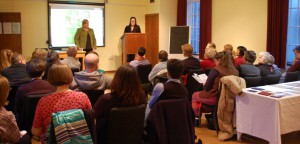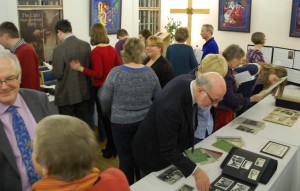Reflections on Stethoscopes and Petticoats
Posted Thursday, 10th April 2014
We were pleased to welcome over 200 visitors to our exhibition: Stethoscopes and Petticoats: The Changing Roles of Non-Conformist Women, with 50 people attending the free talks on The Life and Hymns of Anne Steele and The Life of Dr Ellen Farrer.
The exhibition examined the role of women within the history of the British non-conformist movement, which has traditionally been subsumed under the history of men. The exhibition highlighted the significant contribution non-conformist women made to literature, social and political activism, mission work, and medicine, paving the way for future generations of pioneer women.
We’re very happy to report that evidence of strong, intelligent and progressive non-conformist women is not difficult to find in The Angus. The biggest challenge we had to overcome was narrowing down the exhibition content to just a small selection of 27 key objects. The circumstances of discovering two items for the exhibition were so fortuitous that we began to wonder if the archive itself was trying to tell us something. The first item had been sitting under our noses for several months, having been put out on display contained in a scrapbook in our exhibition on Slavery. The scrapbook contains a selection of abolitionist literature, including a small selection of pamphlets. A visitor conducting research on anti-slavery groups in Birmingham happened upon a pamphlet titled, ‘Reasons for Substituting East India, for West India Sugar’ (1826). Although we had seen the pamphlet in the scrapbook, it was our knowledgeable visitor who directed us to the author of the piece: Elizabeth Heyrick, a Quaker and one of the first activists to call for the immediate abolition of slavery.
The second item which came to be in the exhibition through fortuitous circumstances is a first edition of Mary Wollstonecraft’s A Vindication of the Rights of Woman: with Strictures on Political and Moral Subjects. One of our cataloguers working through the backlog of uncatalogued books within the archive, Lucy Kelsall, happened across the seminal text by chance. Such a discovery, just two weeks before the exhibition was due to open was both exciting and challenging as we knew we would have to work the book into the display without disrupting the rest of our arrangement. Fortunately, it made sense to make a text considered to be one of the earliest works of feminist philosophy item number one in the exhibition!
By Katie Pearce, Learning and Participation Officer
Stethoscopes and Petticoats was Co-Curated by Amanda Sharp and Sukie Trowles, Exhibition Research and Curation of Dr E. Farrer material by Blanca Verdia, Exhibition Research by Flavia Catena. Categories: Events Exhibitions



Recent Comments